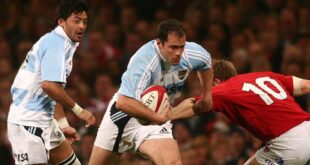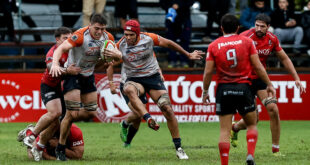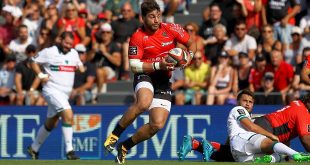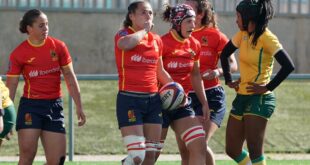This year’s edition of the end-of-year international series again saw countries from the world over playing test match rugby in Europe. Yes, in Europe. This is the subject of the latest edition of Forward Thinking: Make November Northern Hemisphere Tours.
Dated North vs South Terminology
Many members of the global rugby media are stuck in the past. It remains common practice to read about the North vs South divide. Rugby World Cup 2015 had four North vs South Quarter Finals while the November Internationals had southern teams visiting the north.
In actuality this is a dated concept. What global rugby has every November is Europe hosting incoming tours. The North vs South divide is, in actuality, a Europe vs Rugby Championship mindset. End-of-year tours are similarly constructed to replicate this. Every November, excluding Rugby World Cup years, European countries host tests.
Interestingly of the 20 countries that competed at the last Rugby World Cup twelve were non-European. These twelve, and others, all played tests in Europe in las month. So European-centric is the set-up that only two matches were not played in Europe.
Canada, Japan, USA
Canada, Japan and the USA are permanent Rugby World Cup competitors. The only Rugby World Cup not involving all of them was 1995. The debut of South Africa combined with it hosting the tournament saw the Côte d’Ivoire qualifying. Oceania and the Americas were sacrificed a spot each which saw the USA and Fiji missing out. It was only natural for Rugby World Cup 1999 to become a 20-team tournament.
The three Northern Hemisphere countries are also permanent Tier 2 countries. They also are leading candidates to join Tier 1 and two of them currently have professional rugby.
All three are also vital markets. In rugby terms they have massive populations, Canada included. They have all hosted major World Rugby competitions recently and the biggest of them all will be in Japan in 2019.
November 2016
The USA hosted two matches and Japan one. Chicago’s weekend of the Eagles vs Maori All Blacks and New Zealand vs Ireland was tremendous. While Japan vs Argentina in Tokyo was extremely refreshing.
Chicago was chosen as a money-making venture for New Zealand and Ireland. USA Rugby acted to make the most out of it by playing a match in the same city one day earlier. The result was a large crowd just like what had been the case at Philadelphia’s Talen Energy Stadium in November 2013.
The Eagles’ remaining matches in 2013 and 2016 were all in Europe. This saw matches in Romania and Spain. The latter of these was not against Spain but, rather Tonga. France also hosted neutral matches. Canada faced Samoa in Grenoble while Fiji vs Japan took place in Vannes.
November 2017
Is it ideal to play in neutral venues? No. Is it cost-effective? Yes and no. With Canada already in Europe to play Ireland and Romania and Samoa there to play France and Georgia it is cost-effective. On the other hand a Samoan tour of France, Georgia and England could have transpired instead.
Why not have such a tour? Why not have some of Tonga, Samoa, Fiji and Uruguay playing their Northern Hemisphere test matches outside of Europe? Why not look to establish a scenario which attends to the needs of the present not to the needs of the past?
The Pacific Nations Cup is no more. That is to say, the format involving Canada, Japan and the USA no longer exists. The 2016 competition was a Tri Nations competition between Fiji, Samoa and Tonga. That same month Japan played tests against Scotland and Canada. Russia and Italy both also played in Canada and the USA.
November is thereby a viable option to explore for Canada, Japan and the USA to play at home against Fiji, Samoa and Tonga. In the North American and Japanese autumn the weather is conducive to quality test match rugby. Crowds are also gathering. This year’s three matches were all cases in point.
Rotation Model
This year saw Uruguay added for the first time. It meant there were four Tier 2 countries from the south playing in Europe. This number matched that of Tier 2 unions from the north – Canada, Georgia, Romania and the USA.
Additional matches saw Belgium, Germany, Portugal and Spain involved. They could be leveled out numerically through Brazil, Chile, Kenya and Namibia. The latter, miraculously, had no games.
World Rugby could embrace this reality. By working together with the Tier 2 unions it would be able to establish a rotational model. Tours from the South Hemisphere could thereby be to not only Europe but also to North America, Eastern Asia or a combination.
Japan would be able to host a Tier 1 country and two Tier 2 countries every November. This would be complimented by home matches every June. The likes of Italy, Scotland and Wales could thereby continue touring mid-year. The same holds true of playing in North America.
SAMPLE SCHEDULE FOR NOVEMBER 2017 + NOVEMBER 2018
| NOVEMBER 2017 | NOVEMBER 2018 | |
| CANADA | vs USA (home), Tonga, Fiji | vs Samoa, Namibia, USA (away) |
| USA | vs Canada (away), Fiji, Tonga | vs Namibia, Samoa, Canada (home) |
| JAPAN | vs South Africa, Fiji, Maori All Blacks | vs Argentina, Barbarians, Samoa, Russia (home) |
| GEORGIA | vs Argentina, Uruguay, Italy | vs Scotland (home), Namibia, Tonga, |
| ROMANIA | vs Scotland, Maori All Blacks | vs Italy (home), Uruguay, Namibia |
| BELGIUM | vs Brazil, Zimbabwe, Chile | vs Kenya, Brazil, Chile |
| GERMANY | vs Namibia, Chile, Uruguay | vs Uruguay, Kenya, Brazil |
| RUSSIA | vs Uruguay, Namibia, Kenya | vs Brazil, Namibia, Japan (away) |
| SPAIN | vs Chile, Brazil, Namibia | vs Chile, Uruguay, Kenya |
| ENGLAND | vs Australia, Samoa, South Africa | vs Tonga, Australia, New Zealand |
| FRANCE | vs Tonga, South Africa, Argentina | vs New Zealand, Fiji, Argentina |
| IRELAND | vs Maori All Blacks, New Zealand, Australia | vs Australia, Argentina, South Africa |
| ITALY | vs Samoa, Argentina, Georgia (away) | vs Romania (away), South Africa, Fiji |
| SCOTLAND | vs Romania (away), South Africa, New Zealand | vs Georgia (away), Fiji, Australia |
| WALES | vs New Zealand, Australia, Samoa | vs South Africa, New Zealand, Tonga |
 Americas Rugby News Rugby news from across the Americas!
Americas Rugby News Rugby news from across the Americas!




